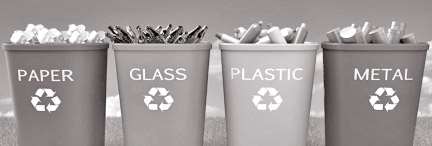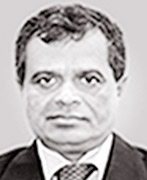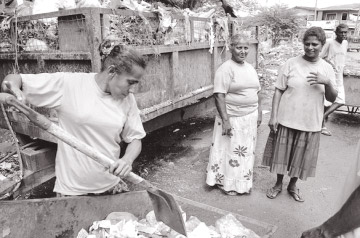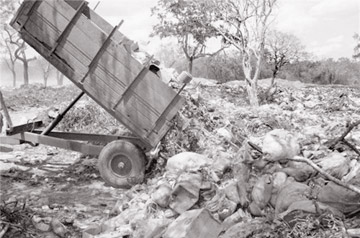|
Solid waste management by LG bodies :
Garbage separation to be popularised
By Ranil Wijayapala
|

Proper separation of waste
|
The mountains of garbage in the outskirts of Colombo city and
adjoining areas created headlines in the media during the past few
months as garbage in Colombo became a controversial topic. Protests over
the mountains of garbage raises many issues with regard to the
management of solid waste in the country.
The Colombo Municipal Council (CMC), the biggest municipal council in
the country which generates nearly 600 to 700 metric tonnes of garbage
daily, has had to resort to new mechanisms in solid waste management
from June 1, as the dumping of garbage from Colombo in Meethotamulla
drew huge protests from the people living in and around Meethotamulla.
True, the Colombo Municipal Council started collecting only sorted
and separated garbage from June 1, as an immediate solution, to reduce
the amount of garbage dumped at the Meethotamulla dumping site, after
distributing polythene sacks among householders in the Colombo city, but
there are serious doubts about how far the CMC can continue with this
program as it requires a major campaign to educate citizens prior to the
implementation of such a project.
According to information from the CMC, only 20,000 poly-sacks have
been distributed among the households so far although the target was to
distribute 200,000 poly-sacks in the city limits.
At the same time, the motivation of the Mayor of Colombo, which is a
key factor for the success of this program, has not come effectively as
apparently he himself was not aware of the future of the program to be
implemented by the officials of the Council.
The experience of the officers engaged in this program in solid waste
management is also a contributing factor for the success of the program.
Therefore, it is a prerequisite on the part of the Local Government
bodies to have a clear vision about the future plans of solid waste
management in their areas, as it would become a major issue for them in
the near future.
|

Secretary to the Ministry of Provincial Councils and Local
Government
R.A.A.K. Ranawake |
This is not a problem faced only by the Colombo Municipal Council,
however.
The 335 Local Government bodies spread all over the country are also
facing similar crises at different stages and different levels when
managing solid waste within their local authority areas.
Composting projects

Garbage collecting |
 |
| Disposal of
garbage in dumps |
According to the Secretary to the Ministry of Provincial Councils and
Local Government R.A.A.K. Ranawake, these 335 Local Government bodies
are handling 6,400 metric tonnes of garbage on a daily basis and 110
Local Government bodies are implementing composting projects as a part
of the solid waste management programs.
However, it is only a handful of Local Government Bodies such as
those in Weligama, Balangoda, Kuliyapitiya and Bandarawela that are
successful in implementing their composting and recycling projects.
“Therefore, there is a necessity to have an immediate national level
plan to enlighten the Local Government authorities and the public with
regard to the flow of solid waste from homes to the recycling centres
and the final disposal sites as it is a key factor for the success of
these composting projects”, Ranawake said.
The public can also contribute to resolve this issue by disposing or
composting the garbage collected at their households on their own
without transferring that problem to the Local Government bodies,
thinking that it is the duty of the Local Authority to collect their
garbage and dispose of it.
The consumer pattern of the people is also contributing immensely to
the increased volume of garbage in the country.
“Take toys as an example; children do not use toys for a long period.
They dump them after using them for a week or two. Even clothes are
changed very frequently, resulting in them being added to garbage
dumps”, he said.
Therefore, it has become very difficult to manage the solid waste
collected at households without making a change in public consumer
patterns.
“Even though we encourage the Local Government authorities to venture
in to composting of garbage, they face difficulties in marketing the
compost they produce at these composting sites as compost is not so
popular among the public”, he said.
“If we can make use of that compost for tea, rubber or coconut
plantations, we can create a proper market for them. Unfortunately,
there is no such program at present. That is why we need a national
level program to popularise compost fertiliser among people to encourage
the Local Government bodies to have composting sites”, he said.
Lack of lands for dumping of even the final residue is also a big
issue faced by Local Government authorities in managing solid waste.
“Many Local Authorities are facing this problem and the Ministry of
Provincial Councils and Local Government is targeting to solve the land
issue by the end of this year by providing the required lands for them”,
he said.
“On this endeavour we are working with the Land Reforms Commission,
Plantations Ministry, Forest Department, Wildlife Conservation
Department, Coconut Development Authority and other government
institutions to find land for this purpose”, he said.
The other major challenge faced by the Local Government authorities
is public displeasure and protests over garbage dumping sites and solid
waste management projects in their areas. Many initiatives to resolve
the issue of garbage by introducing new technology have failed due to
public protests.
Landfill project
For instance, the implementation of the sanitary landfill project in
Dompe in the Gampaha district was delayed for years due to public
protests instigated by politicians in the area.
Another project initiated by the Western Province Waste Management
Authority along with the Kaduwela Municipal Council to have a ‘waste to
energy’ project has also been temporarily suspended due to protests
despite initiating the project after educating the public in the area.
It has been observed that the same politicians who agitate for an
amicable solution to the garbage problem, are protesting against these
projects, thus aggravating the problem of garbage.
“To manage this situation, we have to encourage the people to focus
more attention towards recycling of garbage as it would reduce the stock
of garbage to be dumped in these sites”, he said.
To solve this issue of garbage, the support of the public is
essential and if they fulfil their responsibility, the authorities can
manage solid waste effectively.“The Ministry of Local Government plans
to issue plastic bins for the people to collect disposable garbage and
recyclable garbage separately. We want to create that culture among the
people. We are planning to provide these bins at their doorstep,
charging only the cost of the bin. Then, they will be able to buy and
keep them at their houses to collect garbage”, he said.
Cost of bin
“For people with better income levels, we plan to provide these bins
covering only the cost of the bin, while for low income groups, we will
distribute the bins at a 50 percent concessionary rate. The differently
abled and widows with no income will be provided these bins free”,
Ranawake said.“What we need is to create a new culture in garbage
separation at the point of generation”, he said.Director of the National
Solid Waste Management Support Centre Mangalika Lokuliyana said many
Local Authorities are having the vehicles and other facilities with them
and the Local Government Ministry is supervising the solid waste
management projects by Local Government bodies by providing them with
technical assistance, guidelines and creating policies.
In the Western Province, the Waste Management Authority is
supervising waste management by the Local Government bodies. “The
separation of garbage at the place of generation is the most suitable
method of managing the garbage as it can reduce the quantity of garbage
that goes to the final disposal sites”, she said.The National Solid
Waste Management Support Centre is planning to introduce this program in
the North Western Province parallel to the Deyata Kirula program.
“Now we are in the process of providing garbage collecting bins or
composting bins for the people in those Local Government bodies to
implement this program in the North Western Province and to expand this
program in the country later”, she said.
“As the Ministry, we have supplied composting projects for several
Local Government bodies and have provided facilities to educate
schoolchildren on recycling and composting projects. There are many
projects which have been successfully implemented and we have entered
the path of educating the public about waste separation”, she said. |


